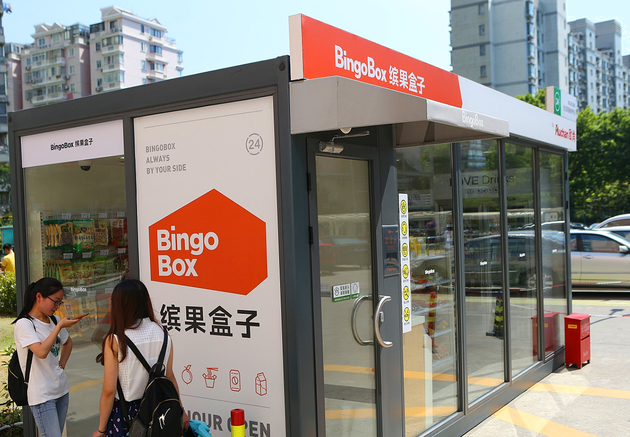Jan. 18 (NBD) -- China's unstaffed store startup BingoBox made an announcement on Wednesday that it has raised 80 million U.S. dollars in its series B financing round, hitting a record high in the unmanned convenience store field.
The investment was led by Fosun Capital, the investment arm of the Chinese conglomerate Fosun International Ltd., and original investors including Prometheus Capital, Qiming Venture Partners, GGV Capital, and Ventech China also participated in the new round, according to the company announcement.
5,000 BingoBox stores scheduled to be opened in one year
Chen Zilin, founder and CEO of BingoBox, told NBD in an interview that human beings tend to consciously choose the most efficient way of working, and this becomes the impetus of social development. As one of the most efficient consumption scenarios, the cashier-free convenience store sector will grow further and will account for 40 percent of the retail market, he added.
Chen further pointed out that both startups and giants have entered the niche sector because of the great potential in the fully-automated convenience store market.
NBD noted that it is the first time that Fosun made investment in an automated convenience store operator.
Fosun will utilize its resources including real estate, community property service network and media channels to help enhance BingoBox's competitiveness, noted Yu Genling, Executive Director of Fosun Group's New Retail Strategic Investment Division.
However, an insider said to NBD that China's unstaffed convenience store industry is still at the initial stage.
On the same day of the new financing round, BingoBox announced the plan to open a large number of new stores in the next few months in cities where it has already had a presence, with a goal of offering a convenient store to every 20,000 people. In this way, there will be 500 BingoBox stores in an area with a population of 10 million.
In July last year, BingoBox voiced an ambitious plan to open 5,000 stores in one year, which incorporate directly-run stores and franchised ones, but now it only has around 200 convenience stores across China, far less than the scheduled goal.
The cashierless convenience store startup, however, is still optimistic about the expansion plan. The company failed to achieve the expansion target in the early stage due to capacity problem, a person-in-charge of the company told NBD. Such problem has been resolved and won't hold up the expansion pace now, added he.
The number of BingoBox's facility suppliers has increased to six, according to the source.

Photo/VCG
New technology to transform family-run small stores in communities
With the announcement of the new financing round, the company also released BingoBox Mini, the new-generation self-service check-out solution based on the image recognition technique.
The new solution is scheduled to be launched in the first quarter of 2018.
Regarded as the key technology of the cashier-free convenience stores, the goods identification technology has been brought into the spotlight. The Radio Frequency Identification technology, which has been widely used in the unmanned retail field, is criticized for the high cost, and labels equipped with such technology cost at about 0.5 yuan each.
In China, retail stores with the highest labor cost percentage are not supermarkets such as Yonghui Superstores or Walmart, but mom-and-pop convenience stores in communities, Chen Zilin said, adding that such stores spend an average of around 90 percent of the day time waiting for customers and the rest 10 percent doing business.
BingoBox Mini and other technical improvements will enable these stores to save over 50 percent of their labor costs, and the new solution can be applied in all the 6.8 million family-run small convenience stores in China, said Chen.
While BingoBox tends to transform China's mom-and-pop convenience store market, Alibaba, JD.com, Suning and other retail titans are also eyeing the community-based convenience store segment.
Last year, Alibaba expected to upgrade these small convenience stores across China into the ones in line with the consumption trend, with an aim to have 10,000 such stores in one year.
JD.com also made a plan to build over 1 million JD convenience stores across the country in the next five years, half of which will be in the rural areas, said Liu Qiangdong, Chairman of the Board of Directors and CEO of JD.com.
Email: zhanglingxiao@nbd.com.cn


 川公网安备 51019002001991号
川公网安备 51019002001991号





